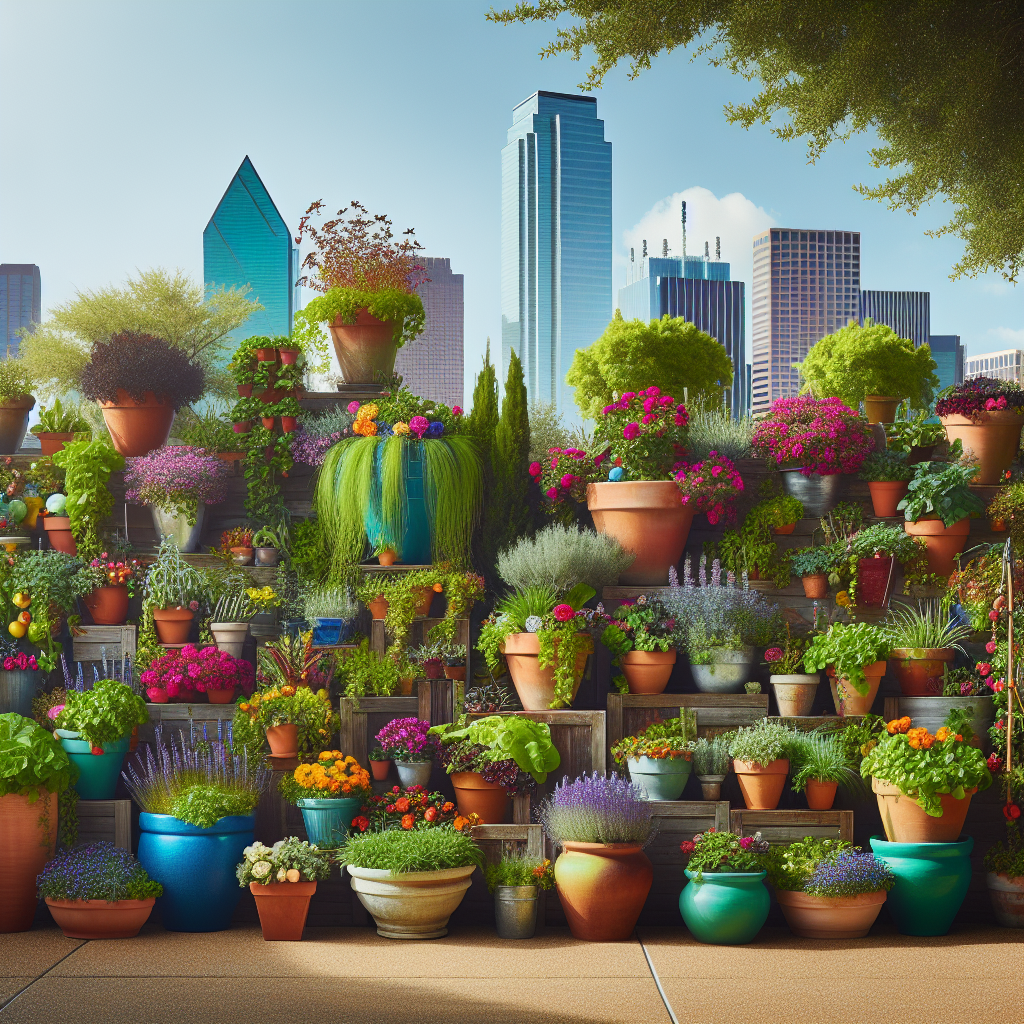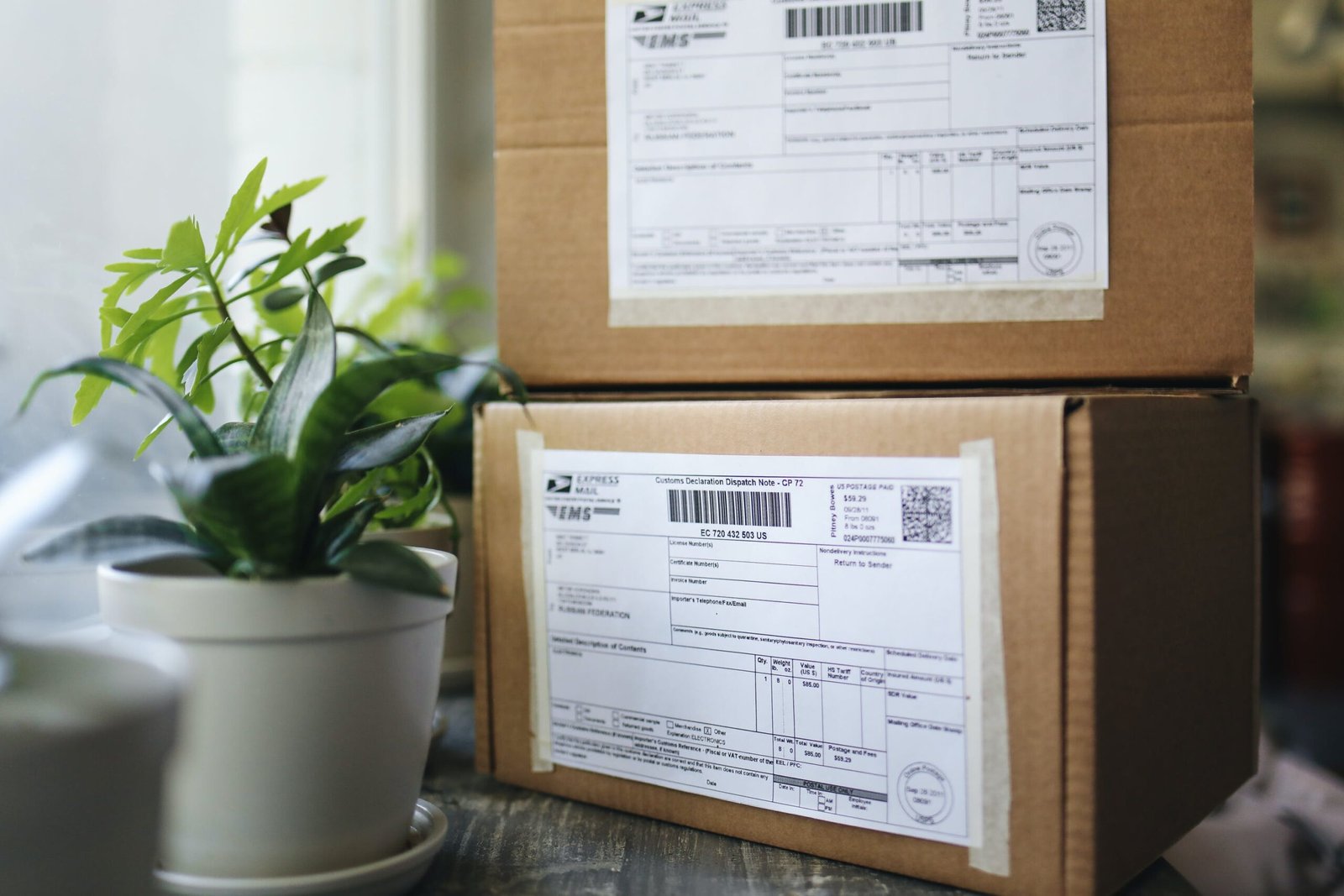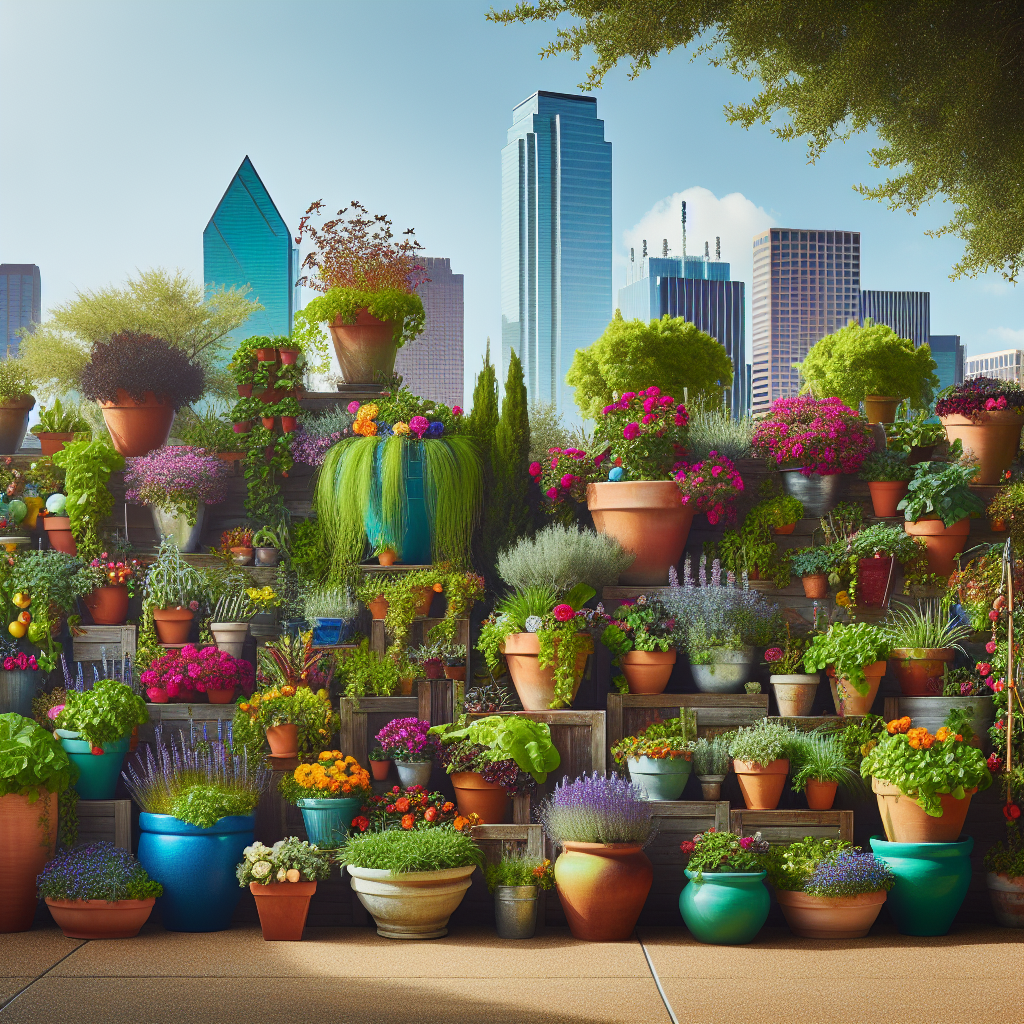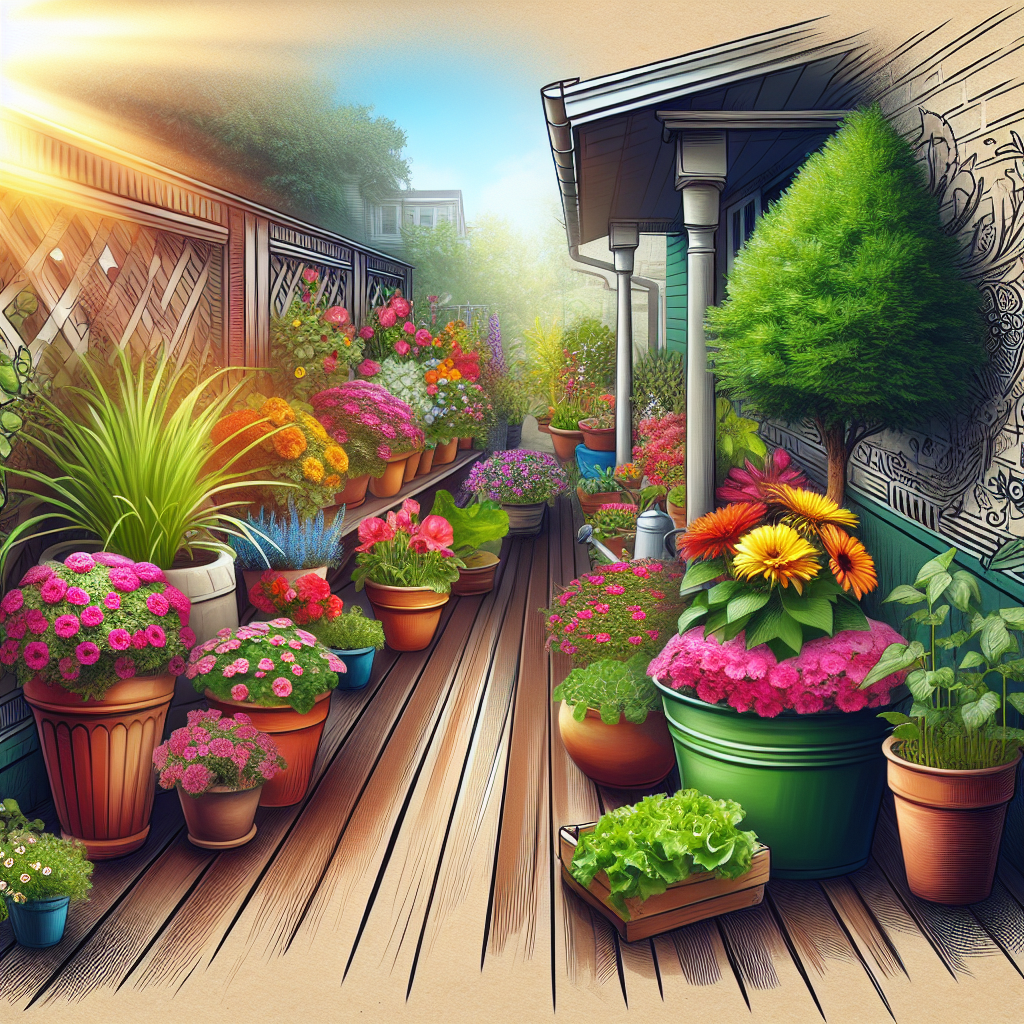
Are you a nature enthusiast looking to bring a touch of green into your urban lifestyle? Look no further than the joy of container gardening in Dallas, Texas. With its warm climate and ample sunshine, this thriving city provides the perfect environment for nurturing and cultivating your own mini garden oasis. Say goodbye to limited space and embrace the possibilities of container gardening, where even the smallest balcony or patio can be transformed into a flourishing haven of vibrant plants and fragrant herbs. Whether you’re a seasoned gardener or a beginner with a green thumb, let the joy of container gardening in Dallas inspire you to create a beautiful and sustainable urban sanctuary.

Benefits of Container Gardening
Flexibility and Portability
Container gardening offers incredible flexibility and portability, making it the perfect choice for those who love to rearrange their outdoor spaces. With container gardens, you have the freedom to move your plants around your yard or balcony, depending on the season or your personal preferences. This flexibility allows you to experiment with different layouts and create visually appealing arrangements that suit your style.
Minimal Space Required
One of the most significant advantages of container gardening is that it requires minimal space. Whether you live in a small apartment or have a limited backyard, you can still enjoy the beauty of gardening by utilizing containers. From compact herb gardens to vertical planters, container gardening allows you to maximize your available space and cultivate a wide variety of plants, even in the tightest of areas.
Easy Maintenance
Maintaining a container garden is incredibly straightforward and requires minimal effort. Containerized plants are generally easier to care for as compared to traditional garden beds. With containers, you have better control over watering and fertilizing, which helps prevent over or under-watering and ensures proper nutrient uptake. Additionally, container gardens are less prone to weed invasion and require less bending or kneeling, making them a popular choice for individuals with physical limitations.
Accessibility for Different Age Groups
Container gardening is an accessible hobby for people of all ages and skill levels. Whether you’re a seasoned gardener or a beginner, container gardening offers a hands-on and rewarding experience. It provides an excellent opportunity for children to learn about the natural world, encouraging them to develop an appreciation for plants and the environment. For older adults, container gardening can be a therapeutic activity that promotes relaxation and enhances overall well-being.
Choosing the Right Containers
Consider Size and Depth
When selecting containers for your garden, it is essential to consider the size and depth requirements of your plants. Some plants, such as tomatoes or root vegetables, have deep root systems and need larger containers to thrive. On the other hand, smaller plants like herbs or annual flowers can flourish in shallower containers. Take into account the mature size of your chosen plants and ensure that your containers provide enough space for their growth.
Ensure Proper Drainage
Proper drainage is crucial to the success of your container garden. Without adequate drainage, excess water can accumulate in the container, leading to root rot and other plant diseases. Look for containers with drainage holes in the bottom to ensure that water can freely escape. If you fall in love with a container that doesn’t have drainage holes, you can create them yourself using a drill or a hammer and a nail.
Select Materials for Durability
Containers come in a variety of materials, each with its unique benefits and considerations. Plastic containers are lightweight, affordable, and retain moisture well. They are an excellent choice for beginner gardeners or those on a limited budget. Ceramic or terracotta containers offer a more aesthetically pleasing option and provide better insulation for plant roots. However, they can be heavy and may require more frequent watering. Consider your needs, budget, and aesthetic preferences when selecting the material for your containers.
Evaluate Aesthetics
Container gardening not only provides an opportunity to grow plants but also allows for creative expression and beautification of your outdoor space. When choosing containers, consider how they will visually complement your surroundings. You can opt for coordinating containers that create a cohesive look or mix and match different styles and colors to add visual interest. Play with textures, shapes, and sizes to create a unique container garden that reflects your personal style.

Selecting the Ideal Plants
Adaptability to Dallas Climate
Dallas, Texas, is known for its hot and humid summers and mild winters. When selecting plants for your container garden, it is crucial to choose those that can thrive in the specific climate conditions of Dallas. Look for plants that are heat-tolerant, drought-resistant, and can withstand occasional cold snaps. Native plants and those adapted to the region are often the best choices, as they have already acclimated to the local weather patterns.
Suitability for Container Gardening
Not all plants are well-suited for container gardening. Some plants have extensive root systems or require ample space to grow and produce a bountiful harvest. When choosing plants for your containers, look for compact varieties or those specifically bred for container gardening. These plants tend to have more compact root systems and can thrive in the confined space of containers. Additionally, consider the growth habit of the plants to ensure they won’t outgrow their containers too quickly.
Space and Sunlight Requirements
Different plants have varying sunlight and space requirements. Before selecting plants for your container garden, assess the amount of sunlight available in the chosen garden space. Some plants, like tomatoes or peppers, require full sun to produce abundant yields, while others, such as ferns or hostas, thrive in shade or partial shade. Additionally, consider the size of your containers and the space required for each plant’s growth habit. Avoid overcrowding plants as it can lead to poor air circulation and increased risk of disease.
Preparing Container Garden Space
Assessing Sunlight Availability
Before embarking on your container gardening journey, it is crucial to assess the sunlight availability in your chosen garden space. Determine whether your garden receives full sun, partial shade, or full shade at different times of the day. This information will help you select the appropriate plants that can thrive in the given light conditions.
Determining Suitable Locations
Once you have assessed the sunlight availability, you can choose suitable locations for your containers. Place containers in areas that receive the recommended amount of sunlight for your chosen plants. Consider the microclimate of your space as well – areas near buildings or fences tend to be warmer, while areas exposed to strong winds may require more wind protection. Additionally, ensure that the locations you choose allow for easy access and maintenance of your containers.
Preparing Soil Mix
Creating a well-draining and nutrient-rich soil mix is essential for the success of your container garden. Start by selecting a high-quality potting mix or create a custom blend by combining equal parts compost, perlite or vermiculite, and peat moss or coconut coir. This mixture provides good drainage while retaining moisture and nutrients for the plants. Avoid using garden soil alone, as it tends to become compacted in containers and may harbor pests and diseases.
Arranging Containers Strategically
To maximize the visual impact of your container garden, consider arranging your containers strategically. Place taller plants towards the back or center of your display and fill in the front and sides with shorter plants. This creates a sense of depth and allows each plant to be showcased effectively. Experiment with different container heights, textures, and colors to create an eye-catching arrangement that will be the envy of your neighbors.

Essential Tools and Equipment
Hand Trowel and Pruners
A hand trowel and pruners are essential tools for any gardener, including those practicing container gardening. The hand trowel is perfect for planting seedlings, transferring soil, and loosening compacted soil in containers. Pruners, on the other hand, are useful for maintaining the size and shape of your plants by trimming away dead or overgrown branches. Invest in a good quality hand trowel and pruners for comfortable and efficient gardening.
Watering Can or Hose
Proper watering is crucial for the health of your container plants. Depending on the size of your garden space, you may opt for a watering can or a hose with a gentle sprayer attachment. A watering can is suitable for smaller gardens and provides greater control over water distribution. A hose with a sprayer attachment is more convenient for larger gardens, as it allows for efficient watering. Whichever method you choose, remember to water your containers thoroughly, ensuring that water reaches the root zone.
Organic Fertilizers
Container plants rely on regular fertilization to obtain essential nutrients, as the limited soil volume cannot provide an ample supply. Organic fertilizers are a great choice for container gardening, as they release nutrients slowly, promoting long-term plant health. Look for organic fertilizers specifically formulated for container gardening and follow the recommended application rates. Regular application of organic fertilizers will ensure that your plants thrive and produce an abundant harvest.
Mulch and Protective Covers
Mulching your containers helps retain moisture in the soil, regulate soil temperature, and suppress weed growth. Organic mulches, such as straw or shredded leaves, not only serve as effective moisture retainers but also add a decorative touch to your container garden. Additionally, consider using protective covers, such as row covers or nets, to shield your plants from pests, harsh weather, or excessive sunlight. These covers provide a physical barrier and can help extend the growing season for your plants.
Planting and Maintaining Container Gardens
Planting Seeds or Transplants
Container gardens can be started from seeds or transplants, depending on your preference and gardening goals. Seeds offer a more affordable option and allow you to choose from a wider variety of plants. Start seeds indoors or follow the recommended planting dates for your specific plant varieties. Transplants, on the other hand, provide a head start and are especially beneficial for plants with longer growing seasons. Ensure that your containers are properly prepared with soil mix and follow the specific planting instructions for each plant.
Watering and Moisture Control
Proper watering is essential for container gardens, as plants rely on adequate moisture to thrive. Check the moisture levels of your containers regularly and water when the top inch of soil feels dry. Avoid overwatering, which can lead to root rot and other plant issues. Mulching your containers can help retain moisture and reduce the frequency of watering. During hotter months, you may need to water more frequently, while cooler months may require less watering. Adjust your watering schedule according to the specific needs of your plants.
Fertilizing and Nutrient Management
Regular fertilization is vital for the health and productivity of your container plants. Follow the recommended application rates for your chosen organic fertilizers and apply them according to the plant’s specific needs. Organic fertilizers release nutrients slowly and help maintain the nutrient balance in the soil. As container gardens have limited soil volume, it is crucial to monitor nutrient levels and provide additional fertilization when necessary. Be mindful not to over-fertilize, as excessive nutrient levels can lead to nutrient imbalances and plant stress.
Pruning and Trimming
Pruning and trimming are essential maintenance tasks for container gardens. Regularly inspect your plants for dead or damaged branches and remove them promptly. This promotes healthy growth and prevents the spread of disease. Additionally, some plants benefit from selective trimming to maintain their desired shape or size. Pruning also encourages branching and can enhance flowering or fruit production. Use clean and sharp pruners to make clean cuts and minimize stress on the plants.

Troubleshooting Common Container Garden Issues
Pest and Disease Control
Like any other type of gardening, container gardens are susceptible to pests and diseases. Monitor your plants regularly for any signs of pest infestation or disease symptoms. Integrated pest management techniques, such as hand-picking pests and using organic insecticidal soaps or oils, can help control common garden pests. For diseases, practice proper sanitation by removing infected plant material and optimizing growing conditions to prevent the development and spread of diseases.
Weed Management
Weeds can easily find their way into container gardens and compete with your plants for nutrients and space. Regularly inspect your containers and remove any weeds that appear. Applying mulch to the surface of your containers can help suppress weed growth. When removing weeds, be cautious not to disturb the roots of your plants. Hand-pulling or using a small weeding tool can be effective methods for managing weeds in container gardens.
Dealing with Overwatering or Underwatering
Overwatering or underwatering can cause significant problems for container gardens. Both scenarios can lead to plant stress, root rot, and overall decline in plant health. The key to avoiding these issues is to find the right balance. Monitor your containers closely and check the moisture levels regularly. Adjust your watering schedule based on the specific needs of your plants and the prevailing weather conditions. Remember to water thoroughly, allowing excess water to drain away, and avoid allowing the plants to sit in standing water.
Addressing Nutrient Deficiencies
Due to the limited soil volume in containers, nutrient deficiencies can occur more readily than in traditional garden beds. Symptoms of nutrient deficiencies, such as yellowing leaves or stunted growth, should be addressed promptly. Evaluate the specific nutrient requirements of your plants and provide additional fertilization as needed. Typically, organic fertilizers formulated for container gardening contain a balanced mix of nutrients, ensuring your plants receive the essential elements they need for vigorous growth.
Creative Container Garden Designs
Vertical Gardens
Vertical gardens are an excellent way to maximize space and create visual interest in your container garden. Utilize trellises, hanging baskets, or wall-mounted planters to grow vining plants, such as cucumbers, pole beans, or climbing flowers. Vertical gardens not only save space but also add a unique architectural element to your outdoor space, making them an ideal choice for urban dwellers with limited garden areas.
Herb Gardens
Herb gardens are a popular choice for container gardening due to their versatility and culinary value. Plant a variety of herbs, such as basil, rosemary, thyme, and mint, in separate containers or combine them in a larger planter. Place your herb garden near your kitchen for easy access while cooking. Not only will you have an abundant supply of fresh herbs, but the fragrant foliage will also add a delightful aroma to your outdoor space.
Flower Gardens
Container flower gardens allow you to create vibrant displays and experiment with different color combinations. Choose a variety of flowering annuals or perennials that thrive in the Dallas climate and have similar soil and light requirements. From petunias and marigolds to zinnias and geraniums, the options are endless. Arrange your containers in groups or clusters to create a visually stunning flower garden that will brighten up any space.
Compact Fruit and Vegetable Gardens
Yes, even fruits and vegetables can thrive in containers! Many compact and dwarf varieties of fruits and vegetables are perfectly suited for container gardening. Cherry tomatoes, strawberries, peppers, and radishes are just a few examples of crops that can be successfully grown in containers. These compact gardens offer the added benefit of having fresh, homegrown produce right at your fingertips, regardless of your available space.

Container Gardening for Urban Dwellers
Balcony Gardens
For those living in apartments or condos, balcony gardens provide a wonderful opportunity to connect with nature and enjoy the benefits of container gardening. Utilize railing-mounted planters, hanging baskets, or vertical planters to maximize your balcony space. Select smaller plants or compact varieties that can thrive in the limited sunlight and space conditions typically found on balconies. Balcony gardens not only beautify your outdoor space but also create a cozy sanctuary in the midst of the bustling city.
Rooftop Gardens
Rooftop gardens offer a unique and exciting container gardening experience. Due to their elevated position, rooftop gardens receive ample sunlight, creating optimal growing conditions for a wide range of plants. Check with your building management or consult a professional to ensure that your rooftop can support the weight of the containers and adequate drainage can be provided. Establishing a rooftop garden allows you to enjoy the benefits of gardening while making the most of underutilized space.
Patio Gardens
Patios and courtyard areas are perfect locations for container gardens. Whether you have a small patio or a spacious courtyard, container gardens can transform these areas into tranquil and inviting retreats. Create a cozy seating area surrounded by lush plants or arrange containers along the perimeter to define and enhance the space. Select plants that suit your desired ambiance and create a tranquil oasis right in your own backyard.
Community Gardens
If you don’t have access to ample outdoor space, consider joining a community garden. Community gardens provide individuals and families with the opportunity to grow their own produce and establish a connection with like-minded gardeners. Many community gardens offer designated areas for container gardening, allowing you to enjoy the benefits of gardening and contribute to a thriving gardening community.
Joining Dallas Container Gardening Communities
Local Gardening Clubs
Joining a local gardening club is an excellent way to connect with other gardening enthusiasts in your community. These clubs often organize workshops, plant swaps, and garden tours, providing opportunities to learn from experienced gardeners and exchange valuable tips and advice. Look for gardening clubs in your area and get involved in activities that interest you. Sharing your container gardening experiences with others is a great way to learn and grow as a gardener.
Workshops and Events
Keep an eye out for workshops and events focused on container gardening in Dallas. Local nurseries, botanical gardens, and community centers often host educational programs specifically tailored to container gardening. These workshops provide hands-on learning experiences and expert guidance, empowering you with the knowledge and skills needed to create and maintain a flourishing container garden.
Online Forums and Social Media Groups
With the rise of technology, it has become easier than ever to connect with fellow gardeners through online forums and social media groups. Joining gardening-related groups on platforms like Facebook or Reddit allows you to ask questions, seek advice, and share your own experiences with like-minded individuals. Participating in these communities not only expands your knowledge but also provides a sense of camaraderie and support in your container gardening journey.
In conclusion, container gardening offers a multitude of benefits for individuals in Dallas, Texas, and beyond. Its flexibility, minimal space requirements, ease of maintenance, and accessibility make it an ideal choice for gardeners of all ages and skill levels. By selecting the right containers, choosing suitable plants, preparing the garden space, utilizing the necessary tools, and troubleshooting common issues, you can create a thriving container garden that enhances your outdoor living space and brings you closer to nature. So start your container gardening adventure today and discover the joy of growing your own plants in Dallas, Texas!





